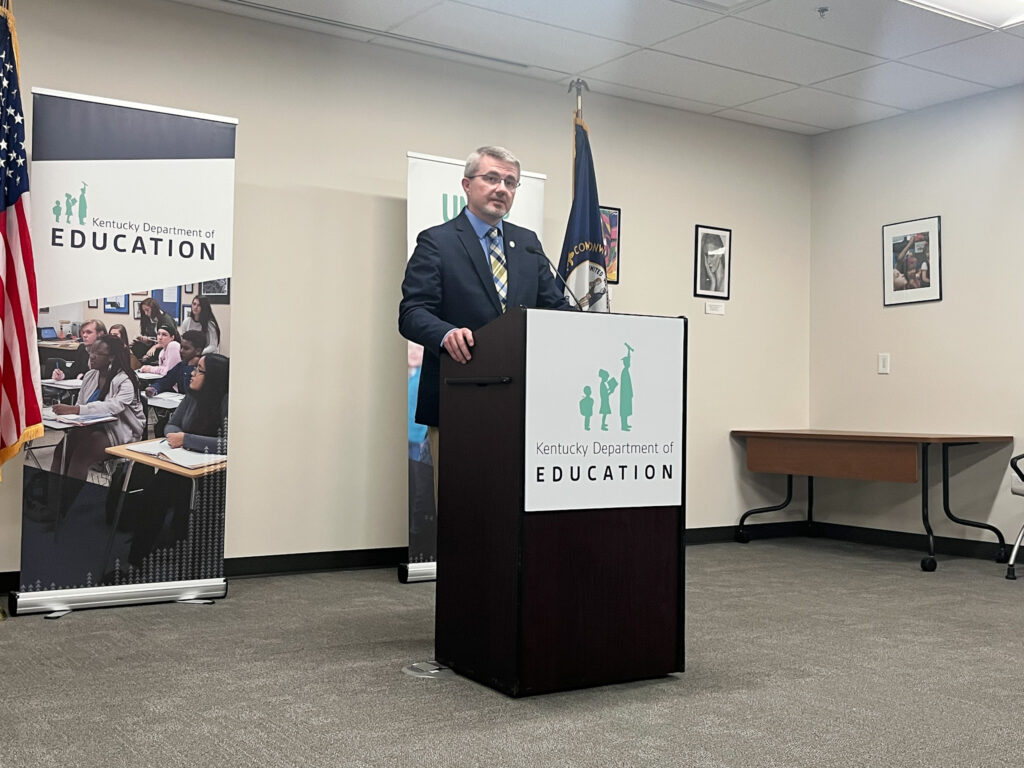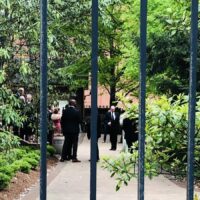FRANKFORT — As he begins his transition from county superintendent to Kentucky education commissioner, Robbie Fletcher says implementing his goals for the state’s public schools will rely on relationships and being present on campuses.
Fletcher, who became the first commissioner to be confirmed by the Kentucky Senate earlier this month, will start at the Kentucky Department of Education on July 1. Now, he is the superintendent of Lawrence County Schools in Eastern Kentucky.

Lawrence County has almost 2,270 students in six schools, according to 2023 school data from KDE. Later this year, Fletcher will oversee the education for more than 630,000 Kentucky students across 171 school districts, the Kentucky School for the Deaf, Kentucky School for the Blind and the 50 state operated area technology centers.
Fletcher told reporters at a Monday press conference that meeting “face-to-face” with people in their communities is important to him.
“One of the things that I’ve learned in my career is regardless of the size of the district, there is one thing that matters most, and that’s relationships,” he said.
Things will look different in Kentucky’s largest public school district — Jefferson County Public Schools with 164 schools in the Louisville Metro area — when compared to small, rural districts, such as Lyon County Schools in West Kentucky, which has three schools.
Earlier Monday morning, Jefferson County Teachers Association President Brent McKim said he looked forward to working with Fletcher whom he had heard praised by other educators. JCTA has previously had quarterly meetings with education commissioners, and McKim said he hopes that continues.
“I think if he engages with the leadership of our school district, with our teachers’ association, and listens to the community stakeholders in our urban setting, he’ll be able to identify our needs and our opportunities, and find ways that the state department of (education) can be a good partner,” McKim said.
JCPS became a hot topic for lawmakers in Frankfort during the legislative session that ended earlier this month. Democratic Gov. Andy Beshear vetoed a House resolution to create a task force that would look at the governance of the school district, calling it “the General Assembly’s latest attempt to set the framework for the legislature to divide the Jefferson County Public Schools district.” The Republican-controlled General Assembly easily overrode the veto.
Fletcher said he plans to work with Marty Pollio, the superintendent of JCPS and ask how KDE can assist the school district in the future.
Of superintendents in general, Fletcher said he has a positive relationship with almost 150 of them across Kentucky, and has yet to meet the remaining few. When asked to name some of the statewide education groups he’s been in touch with so far, he highlighted his contact with the Kentucky Association of School Administrators and its Coalition to Sustain the Education Profession.
As for getting support from current teachers, Fletcher plans to get information and data from them about Kentucky’s current education system and make decisions based on that feedback “because we want their input on how it makes our education system better.”

Eddie Campbell, the president of the Kentucky Education Association, said in a statement to the Kentucky Lantern that he had offered his congratulations to Fletcher and added that the union is “committed to working with Commissioner Fletcher to improve the quality and effectiveness of public education for Kentucky’s students, educators, and communities.”
Campbell added that he has worked with Fletcher previously on various committees and has “seen his commitment to students, educators, and public education in the Commonwealth.”
“As commissioner, it is especially important to have a direct link and communication with the educators in our schools every day who are the beating heart of public education,” Campbell said. “To continue improving public education in Kentucky means understanding the issues and challenges that educators confront in our classrooms and provide them the ingredients they need to succeed.”
Fletcher was the first education commissioner to be confirmed by the Senate after a new state law passed in 2023. He will succeed former Education Commissioner Jason Glass, who left the role in September amid tensions with Republicans in the General Assembly.
At the time, Glass did not want to be part of implementing a law that limited how schools can teach about human sexuality and gender identity and freed adult staff to misgender students.
When asked if he thought teachers should respect trans students’ pronouns, Fletcher said he respected a teacher working with a parent and student on that topic.
“Whether I agree with it or not, that’s irrelevant, but I try to make sure the student feels comfortable in my classroom,” he said. “Now, I’m going to love them, regardless of what pronoun that they use. So to me, the pronoun is not nearly as important as am I showing that student respect and love?”
McKim said the biggest challenge facing Fletcher will be “finding common ground between” the Kentucky Board of Education, which is made up of Beshear appointments, and the General Assembly.
Fletcher said Beshear has “been very kind to me,” and added that the governor had appointed him to serve on the Appalachia Regional Advisory Committee. Fletcher also praised his Senate confirmation process. Appearing before Senators gave him a chance to speak with them before stepping into the commissioner role.
“Having those open conversations, those open relationships, makes it a lot better to be able to have those conversations,” Fletcher said.
This article is republished under a Creative Commons license from Kentucky Lantern, which is part of States Newsroom, a network of news bureaus supported by grants and a coalition of donors as a 501c(3) public charity. Kentucky Lantern maintains editorial independence. Contact Editor Jamie Lucke for questions: info@kentuckylantern.com. Follow Kentucky Lantern on Facebook and Twitter.
McKenna Horsley covers state politics for the Kentucky Lantern. She previously worked for newspapers in Huntington, West Virginia, and Frankfort, Kentucky. She is from northeastern Kentucky.






